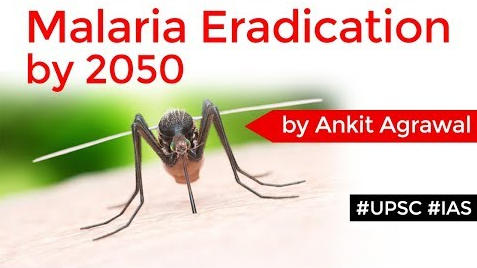Table of Contents

ABOUT THE REPORT
- The report is published in the Lancet Journal.
- It is prepared by a group of 41 leading experts including malariologists, biomedical scientists, economists, and health policy experts.
ABOUT MALARIA
- The parasites in mosquitos that spread malaria belong to the Plasmodium genus.
- The Anopheles mosquito transmits it to humans.
- Once an infected mosquito bites a human, the parasites multiply in the host’s liver before infecting and destroying red blood cells.

FINDINGS OF THE REPORT
- While global malaria incidence and death rates declined by 36 and 60% respectively since the year 2000.
- The advancements are threatened by recent plateaus in global funding.
- There is a rise of malaria cases in 55 countries across Africa, Asia and Latin America, says the report.
- There are still more than 200 million cases of malaria reported annually around the world, claiming nearly 50,000 lives.
- Malaria continues to trap countries in cycles of inequity.
- 85% of global deaths reported in 2017 coming from 29 nations.
- “Malaria continues to strip communities around the world of promise and economic potential.
- This is particularly true in Africa, where just 5 countries account for nearly half of the global burden,” said Winnie Mpanju-Shumbusho, Co-chair of The Lancet Commission on malaria eradication.
SOLUTION
- To achieve eradication within the timeline–
- The Commission urges that specific and deliberate actions at country, regional and global levels must be taken.
- 3 ways to accelerate the decline in malaria cases worldwide.
FIRST
- The Commission suggests that the world must manage and implement current malaria control programmes better.
- With improved use of existing tools — what it calls the “software of eradication.”
SECOND
- The report highlights the need for better “hardware of eradication”.
- With the development and supply of innovative tools that can overcome the biological hurdles in eradication.
THIRD
- Lastly, the authors say that malaria endemic countries and donors must provide more funds.
- It will help in ultimately eradicating the disease.
SUGGESTIONS
- An annual increase of about USD 2 billion would accelerate the progress.
- Crucial role must be played by regional management in eliminating malaria.
- Eradication programmes should avoid being overly academic, and employ professionals from the world of implementation.
- Contributions from business schools and the private sector are crucial






Latest Burning Issues | Free PDF






















 WhatsApp
WhatsApp